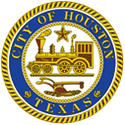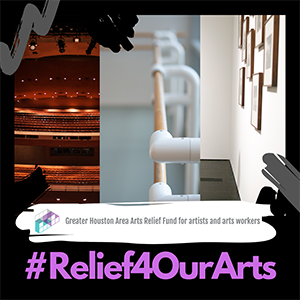 > Cultural Affairs Office > COVID-19 Resources and Emergency Financial Help > Greater Houston Area Arts Relief Fund COVID-19 Impact Survey
> Cultural Affairs Office > COVID-19 Resources and Emergency Financial Help > Greater Houston Area Arts Relief Fund COVID-19 Impact Survey
Cultural Affairs Office
Greater Houston Area Arts Relief Fund COVID-19 Impact Survey
Through a University of Houston Summer Internship provided via The Mayor’s Office of Education (MOE), The Mayor’s Office of Cultural Affairs (MOCA) was able to work with Edgar Sanchez during the summer of 2020 for a virtual internship. Edgar is pursuing a dual degree program for Economics and Spanish and worked to create a completely anonymous survey of the Greater Houston Area Arts Relief Fund recipients to help better understand the state of artists’ and art workers’ needs since the start of the COVID-19 pandemic. GHAARF was the result of an arts collective that organized with Houston Arts Alliance (HAA) to respond to the pandemic. Our thanks to the survey respondents, Dr. Billy Hawkins at the University of Houston, MOE, HAA, and especially Edgar for the results of this project and the valuable insights it provides.
The survey questions were developed in consultation with MOCA Community Liaison Monique Mogilka and translated into Spanish by Edgar Sanchez. HAA distributed the Survey Monkey survey, in English and Spanish, to GHAARF recipients via email in July 2020 with one follow-up reminder email. Out of roughly 400 recipients, there were 122 English responses and 4 Spanish responses for a 31.5% response rate. Below are the key findings of the survey.
DEMOGRAPHICS:
- The survey response pool reflected mostly visual and performance artists.
- A majority of them are White, female, Non-Hispanic, abled, and are citizens of the United States.
REOPENING:
- Since the phased reopening of the state of Texas, a majority of survey respondents indicated that they have not received any job offers, and
- if they have, it is not enough to sustain them.
SUPPORT:
- A majority of respondents indicated that their needs are still BASIC: Rent, food, etc.
- For other avenues of support, a majority of respondents indicated “Grants” or “N/A.”
- 1 in 3 respondents indicated they learned of other avenues of support via searching the internet.
UNEMPLOYMENT:
- A majority (64%) of respondents have applied and received unemployment.
- When asked why they may not have applied, 20% of respondents left the question unanswered.
CHANGES TO PRACTICE:
- A majority of respondents have made changes to their artistic practice during the pandemic.
- For those that indicated changes to artistic practice, most mentioned virtual or online work.
- Only 27% of respondents indicated that changes to practice were successful in generating audience/income.
- A majority of respondents indicated they will be making permanent changes to their artistic practice.
- Those indicating a permanent change mentioned a change related to, from most frequent to least frequent: Virtual Services, Unknown, Personal Health, New Career.
MENTAL HEALTH:
- An overwhelming majority of respondents indicated that the pandemic has given them anxiety regarding their career.
- An overwhelming majority of respondents indicated that they either strongly agreed or agreed to experiencing sleep deprivation or difficulty concentrating.
- 44% of respondents sought help from peers, 17% of respondents sought help professionally, and 30% did not seek help.
- A majority of respondents indicated that they were interested in mental help or support.
OPEN-ENDED QUESTION: “ Is there anything else that you would like to suggest to help you and your community?”
MOST FREQUENT ANSWERS:
- Funding
- Advocacy
- Stronger COVID measures/guidelines on reopening
- Opportunities
- CARES Funding
- Restructuring arts support
- Unemployment
- Connecting community
- Housing
- Financial/legal guidance
- Spanish translations

